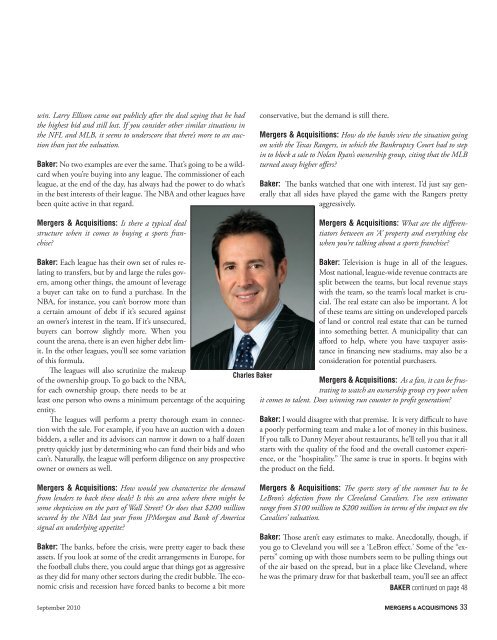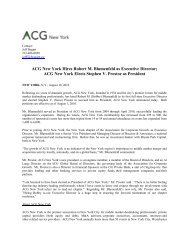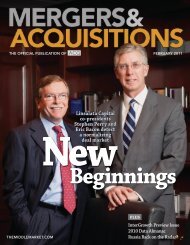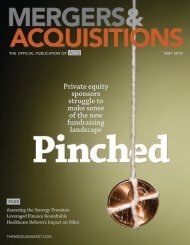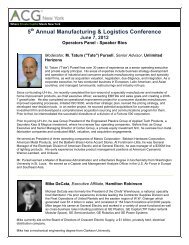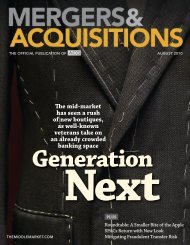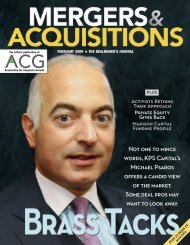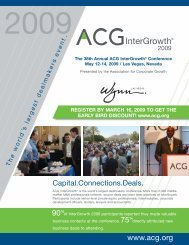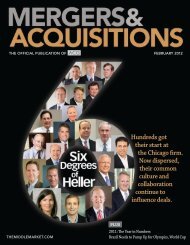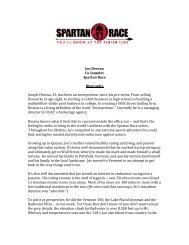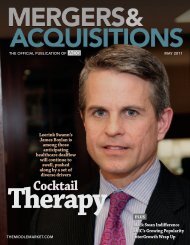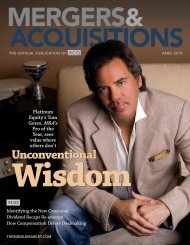September 2010 - Association for Corporate Growth
September 2010 - Association for Corporate Growth
September 2010 - Association for Corporate Growth
You also want an ePaper? Increase the reach of your titles
YUMPU automatically turns print PDFs into web optimized ePapers that Google loves.
win. Larry Ellison came out publicly after the deal saying that he had<br />
the highest bid and still lost. If you consider other similar situations in<br />
the NFL and MLB, it seems to underscore that there’s more to an auction<br />
than just the valuation.<br />
Baker: No two examples are ever the same. That’s going to be a wildcard<br />
when you’re buying into any league. The commissioner of each<br />
league, at the end of the day, has always had the power to do what’s<br />
in the best interests of their league. The NBA and other leagues have<br />
been quite active in that regard.<br />
Mergers & Acquisitions: Is there a typical deal<br />
structure when it comes to buying a sports franchise?<br />
conservative, but the demand is still there.<br />
Mergers & Acquisitions: How do the banks view the situation going<br />
on with the Texas Rangers, in which the Bankruptcy Court had to step<br />
in to block a sale to Nolan Ryan’s ownership group, citing that the MLB<br />
turned away higher offers?<br />
Baker: The banks watched that one with interest. I’d just say generally<br />
that all sides have played the game with the Rangers pretty<br />
aggressively.<br />
Mergers & Acquisitions: What are the differentiators<br />
between an ‘A’ property and everything else<br />
when you’re talking about a sports franchise?<br />
Baker: Each league has their own set of rules relating<br />
to transfers, but by and large the rules govern,<br />
among other things, the amount of leverage<br />
a buyer can take on to fund a purchase. In the<br />
NBA, <strong>for</strong> instance, you can’t borrow more than<br />
a certain amount of debt if it’s secured against<br />
an owner’s interest in the team. If it’s unsecured,<br />
buyers can borrow slightly more. When you<br />
count the arena, there is an even higher debt limit.<br />
In the other leagues, you’ll see some variation<br />
of this <strong>for</strong>mula.<br />
The leagues will also scrutinize the makeup<br />
of the ownership group. To go back to the NBA,<br />
<strong>for</strong> each ownership group, there needs to be at<br />
least one person who owns a minimum percentage of the acquiring<br />
entity.<br />
The leagues will per<strong>for</strong>m a pretty thorough exam in connection<br />
with the sale. For example, if you have an auction with a dozen<br />
bidders, a seller and its advisors can narrow it down to a half dozen<br />
pretty quickly just by determining who can fund their bids and who<br />
can’t. Naturally, the league will per<strong>for</strong>m diligence on any prospective<br />
owner or owners as well.<br />
Charles Baker<br />
Baker: Television is huge in all of the leagues.<br />
Most national, league-wide revenue contracts are<br />
split between the teams, but local revenue stays<br />
with the team, so the team’s local market is crucial.<br />
The real estate can also be important. A lot<br />
of these teams are sitting on undeveloped parcels<br />
of land or control real estate that can be turned<br />
into something better. A municipality that can<br />
af<strong>for</strong>d to help, where you have taxpayer assistance<br />
in financing new stadiums, may also be a<br />
consideration <strong>for</strong> potential purchasers.<br />
Mergers & Acquisitions: As a fan, it can be frustrating<br />
to watch an ownership group cry poor when<br />
it comes to talent. Does winning run counter to profit generation?<br />
Baker: I would disagree with that premise. It is very difficult to have<br />
a poorly per<strong>for</strong>ming team and make a lot of money in this business.<br />
If you talk to Danny Meyer about restaurants, he’ll tell you that it all<br />
starts with the quality of the food and the overall customer experience,<br />
or the “hospitality.” The same is true in sports. It begins with<br />
the product on the field.<br />
Mergers & Acquisitions: How would you characterize the demand<br />
from lenders to back these deals? Is this an area where there might be<br />
some skepticism on the part of Wall Street? Or does that $200 million<br />
secured by the NBA last year from JPMorgan and Bank of America<br />
signal an underlying appetite?<br />
Baker: The banks, be<strong>for</strong>e the crisis, were pretty eager to back these<br />
assets. If you look at some of the credit arrangements in Europe, <strong>for</strong><br />
the football clubs there, you could argue that things got as aggressive<br />
as they did <strong>for</strong> many other sectors during the credit bubble. The economic<br />
crisis and recession have <strong>for</strong>ced banks to become a bit more<br />
Mergers & Acquisitions: The sports story of the summer has to be<br />
LeBron’s defection from the Cleveland Cavaliers. I’ve seen estimates<br />
range from $100 million to $200 million in terms of the impact on the<br />
Cavaliers’ valuation.<br />
Baker: Those aren’t easy estimates to make. Anecdotally, though, if<br />
you go to Cleveland you will see a ‘LeBron effect.’ Some of the “experts”<br />
coming up with those numbers seem to be pulling things out<br />
of the air based on the spread, but in a place like Cleveland, where<br />
he was the primary draw <strong>for</strong> that basketball team, you’ll see an affect<br />
BAKER continued on page 48<br />
<strong>September</strong> <strong>2010</strong> MERGERS & ACQUISITIONS 33


